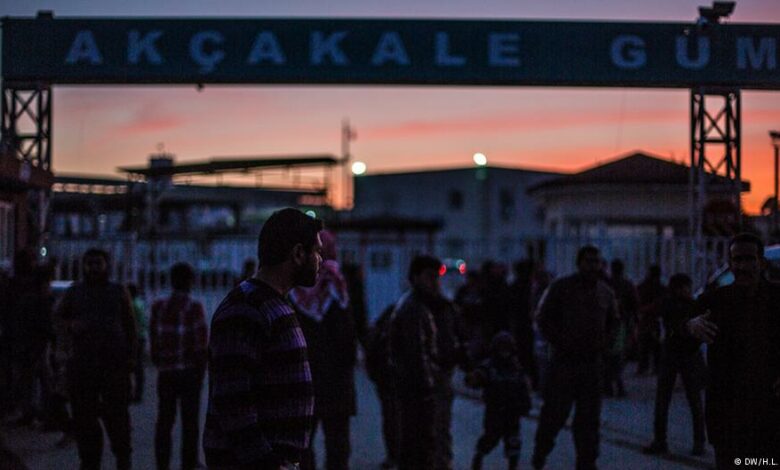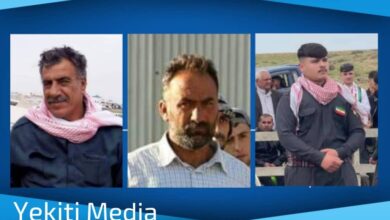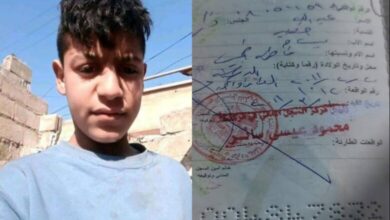
Desperation drives Syrians to Islamic State
Syrian refugees struggling to survive in Turkey see little choice but to cross back into territory controlled by the Islamic State’s hardline Sunni fighters. Swearing allegiance to the self-styled caliphate is the price.
If you want to see what Sykes-Picot – the secret agreement between the British and the French that carved the Middle East up into its current nation states – looks like, you should head to Akcakale.
This small town in south-eastern Turkey nestles on the border with Syria. Just a hundred meters away, past a couple of barbed-wire fences, a railway line and a few meters of no-man’s land, the flat-roofed small town of Tel Abyad begins. Like many towns and cities along this border, Akcakale and Tel Abyad used to be the same place – until a group of mapmakers decided that the railway line that ran through the town should demarcate the border between two countries.
Today the two towns are facing very different fortunes. In January, Tel Abyad fell under the control of the Islamic State of Iraq and Sham (ISIS), the Sunni extremist group that took over a large swathe of Iraq last month and has vowed to tear up Sykes-Picot.
The residents of Akcakale, already accustomed to living on the edge of a civil war, must now get used to living on the border of ISIS’s Islamic caliphate.
The border itself seems remarkably lightly protected – just a few Turkish soldiers man the watchtowers in no-man’s land, while a handful more patrol the streets in soft-topped Land Rovers. One Turkish local said that, despite the light touch border security, he is not afraid of ISIS attacks on this side of the border. “The Turkish intelligence forces are strong,” he told us.
Amazingly, the border is also still open – albeit sporadically and in one direction only. Every Monday, Wednesday and Friday, dozens of Syrians – most of them refugees from the ISIS strongholds of Raqqa and Deir Ezzor – wait in small huddles by the border for the gate to open. Before they are allowed to go through they are fingerprinted and warned that they will not be allowed to come back through the other way. The men waiting by the gate said that that isn’t a problem – if they want to come back into Turkey, they can either pay a people smuggler or use one of the other borders crossings further west, out of ISIS territory.
“I’ve been going in and out of Tel Abyad while it’s been under ISIS, and I’ve not had any problems,” said a 22-year-old who called himself Muslim. “It’s safe, but they are ruling with an iron hand. If you smoke outside your house, they will make big problems – maybe they will cut off your hand.”
Others did not seem so comfortable talking to us openly. “Every day in Tel Abyad they are beheading people,” said one teenage boy. “It’s become a normal thing.”
His friend pulled at his arm. “Don’t talk to journalists!” he warned. “We don’t want problems.” Few other people would speak to us at the border, fearful that ISIS fighters may see them from their lookout posts in Tel Abyad – or, as one man said, that there could be informants on the Turkish side of the border.
‘Don’t blame us’
Given the brutality of the new regime next door, it may seem surprising that anybody would want to go back. But six months after escaping ISIS, many Syrians from Tel Abyad are growing increasingly desperate about their situation in Akcakale. Work is scarce here, and for the easily exploited Syrian workers, wages are cripplingly low.
In a dilapidated house a few streets away from the border, a group of men – ghosts of the old revolution – lay on thin mattresses in the sticky afternoon heat and talked about why they want to go back. Most had fought with the more moderate rebel factions; one had been a civil activist, steadfastly refusing to pick up a weapon even as the revolution descended into war. All of them came to Akcakale because they knew that their lives were in danger as soon as ISIS took control of the territory that they themselves had wrenched from the Syrian regime, but they could see few options other than going back.
“If you see us on the side of ISIS you should not blame us,” said Mohammed, a stout and shaven-headed man in his late 30s. He was once the leader of the FSA’s Omar bin Khatib brigade, but he has not set foot inside Syria for six months.
Subhed
He pointed to another fighter, splayed out on the floor with his injured foot bent beneath him, chain-smoking Marlboro Red cigarettes.
“This guy needs physio,” he said, “but the FSA has let us all down. If you are injured then no one cares for you. I would rather live in an ISIS area. In 15 days I will go back and give them baya’a.”
The baya’a is the act of repentance and swearing of allegiance to ISIS. Two months ago, ISIS announced that it would allow former FSA rebels to go back and live freely in Tel Abyad, so long as they gave their baya’a. Many have taken them up on the offer – all of the rebels we spoke to in Akcakale said that they had friends who had done it. Many said that they were preparing to do it themselves.
“There are no jobs here, I have no money,” said Abu Hussein, a 22-year-old who looked younger than his age but had seen more in the past three years than most men see in a lifetime. He had fought with a moderate Islamic FSA group, the Farouq Brigade, before moving to a more hardline group, Ahrar al Sham, when the Farouq crumbled and disappeared. In January he fought against ISIS in Tel Abyad, before fleeing for his life into Akcakale.
Now, however, he says that he is willing to live under the group that just six months ago was his bitter enemy.
“They have declared that anyone who wants to repent can come,” he said. “They have some negative sides and some positives ones. Tel Abyad is very safe now because people are afraid of them – before it was chaotic. But I have not seen with my own eyes yet how they are applying Shariah (Islamic law).”
Thirty-one-year old Khalid, also a former rebel, said he knew that he would be going back to live under a dictatorship, but given his circumstances, it was the best option.
“I know that in Syria I will have no rights, but that is too bad,” he said. “The Turks treat us like slaves, so home is much better. It is better to die once in Syria than to die every day in Turkey.”
DW




